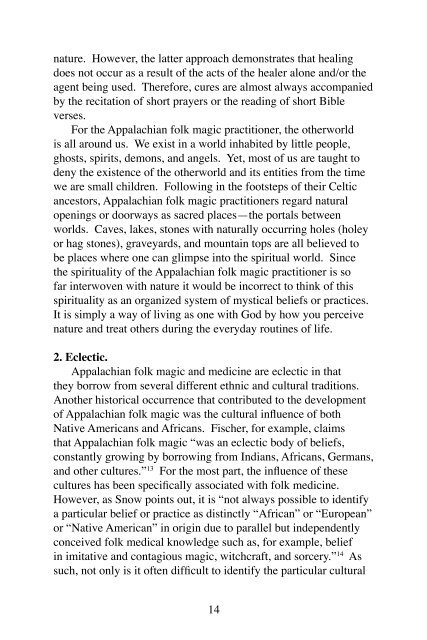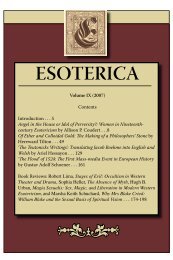Download - Esoterica - Michigan State University
Download - Esoterica - Michigan State University
Download - Esoterica - Michigan State University
You also want an ePaper? Increase the reach of your titles
YUMPU automatically turns print PDFs into web optimized ePapers that Google loves.
nature. However, the latter approach demonstrates that healing<br />
does not occur as a result of the acts of the healer alone and/or the<br />
agent being used. Therefore, cures are almost always accompanied<br />
by the recitation of short prayers or the reading of short Bible<br />
verses.<br />
For the Appalachian folk magic practitioner, the otherworld<br />
is all around us. We exist in a world inhabited by little people,<br />
ghosts, spirits, demons, and angels. Yet, most of us are taught to<br />
deny the existence of the otherworld and its entities from the time<br />
we are small children. Following in the footsteps of their Celtic<br />
ancestors, Appalachian folk magic practitioners regard natural<br />
openings or doorways as sacred places—the portals between<br />
worlds. Caves, lakes, stones with naturally occurring holes (holey<br />
or hag stones), graveyards, and mountain tops are all believed to<br />
be places where one can glimpse into the spiritual world. Since<br />
the spirituality of the Appalachian folk magic practitioner is so<br />
far interwoven with nature it would be incorrect to think of this<br />
spirituality as an organized system of mystical beliefs or practices.<br />
It is simply a way of living as one with God by how you perceive<br />
nature and treat others during the everyday routines of life.<br />
2. Eclectic.<br />
Appalachian folk magic and medicine are eclectic in that<br />
they borrow from several different ethnic and cultural traditions.<br />
Another historical occurrence that contributed to the development<br />
of Appalachian folk magic was the cultural influence of both<br />
Native Americans and Africans. Fischer, for example, claims<br />
that Appalachian folk magic “was an eclectic body of beliefs,<br />
constantly growing by borrowing from Indians, Africans, Germans,<br />
and other cultures.” 13 For the most part, the influence of these<br />
cultures has been specifically associated with folk medicine.<br />
However, as Snow points out, it is “not always possible to identify<br />
a particular belief or practice as distinctly “African” or “European”<br />
or “Native American” in origin due to parallel but independently<br />
conceived folk medical knowledge such as, for example, belief<br />
in imitative and contagious magic, witchcraft, and sorcery.” 14 As<br />
such, not only is it often difficult to identify the particular cultural<br />
14



